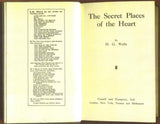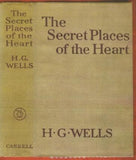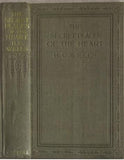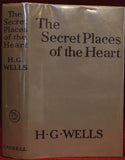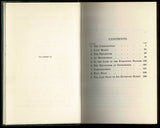The Secret Places of the Heart
Author: Herbert George "H G" Wells (1866-1946)
Year: 1922
Publisher: Cassell and Company, Ltd
Place: London, New York, Toronto and Melbourne
Description:
311 pages. Small octavo (7 1/2" x 5") bound in original green cloth with gilt lettering to spine and blind stamped decoration to spine and front cover. Front cover with blind stamped title and author. First edition.
This thinly-veiled autobiographical novel depicts an English gentleman, Sir Richard Hardy (Wells), who is attempting to sort out his marital problems while he travels the English countryside in the company of a psychiatrist (based loosely on Havelock Ellis). Along the way, Hardy encounters a confident and attractive young American woman named Miss Grammont (Sanger) who is an avid supporter of birth control. The semi-fictional triumvirate of the sexually troubled protagonist, his Freudian doctor and the independent, alluring, self-assured American woman, offered Wells an opportunity to discuss the topics of sexuality, marriage, love, and jealousy: themes that drive many of his other novels and autobiographical works. Secret Places of the Heart also served as a kind of extended love letter from Wells to Sanger in lieu of the actual thing (his letters were usually brief and informational). Late in the book, the protagonist Hardy characterized his affair with Grammont; it could just as well have been Wells writing to Sanger: We have to carry the whole affair on to a Higher Plane - and keep it there. We two love one another - that has to be admitted now. . . . But we two are too high, our aims and work and obligations are too high for any ordinary love making. That sort of thing would embarrass us, would spoil everything. Of course the novel dwells on the impossibility of such an affair surviving in a world encumbered by a more earthly love, bound by obligations. Yet Wells rejoices in physical pleasure, and finds many opportunities in this novel to express ideas about free-love and sexuality that resemble passages in both Sanger's and Ellis' writings. Near the end of the book he writes: It is wonderful enough that we should take food and drink and turn them into imagination, invention and creative energy; it is still more wonderful that we should take an animal urging and turn it into a light to discover beauty and an impulse towards the utmost achievements of which we are capable.
Condition:
Corners gently bumped, some offset darkening to end papers, foxing to page ends else a better than very good copy in a near fine jacket.
Year: 1922
Publisher: Cassell and Company, Ltd
Place: London, New York, Toronto and Melbourne
Description:
311 pages. Small octavo (7 1/2" x 5") bound in original green cloth with gilt lettering to spine and blind stamped decoration to spine and front cover. Front cover with blind stamped title and author. First edition.
This thinly-veiled autobiographical novel depicts an English gentleman, Sir Richard Hardy (Wells), who is attempting to sort out his marital problems while he travels the English countryside in the company of a psychiatrist (based loosely on Havelock Ellis). Along the way, Hardy encounters a confident and attractive young American woman named Miss Grammont (Sanger) who is an avid supporter of birth control. The semi-fictional triumvirate of the sexually troubled protagonist, his Freudian doctor and the independent, alluring, self-assured American woman, offered Wells an opportunity to discuss the topics of sexuality, marriage, love, and jealousy: themes that drive many of his other novels and autobiographical works. Secret Places of the Heart also served as a kind of extended love letter from Wells to Sanger in lieu of the actual thing (his letters were usually brief and informational). Late in the book, the protagonist Hardy characterized his affair with Grammont; it could just as well have been Wells writing to Sanger: We have to carry the whole affair on to a Higher Plane - and keep it there. We two love one another - that has to be admitted now. . . . But we two are too high, our aims and work and obligations are too high for any ordinary love making. That sort of thing would embarrass us, would spoil everything. Of course the novel dwells on the impossibility of such an affair surviving in a world encumbered by a more earthly love, bound by obligations. Yet Wells rejoices in physical pleasure, and finds many opportunities in this novel to express ideas about free-love and sexuality that resemble passages in both Sanger's and Ellis' writings. Near the end of the book he writes: It is wonderful enough that we should take food and drink and turn them into imagination, invention and creative energy; it is still more wonderful that we should take an animal urging and turn it into a light to discover beauty and an impulse towards the utmost achievements of which we are capable.
Condition:
Corners gently bumped, some offset darkening to end papers, foxing to page ends else a better than very good copy in a near fine jacket.







